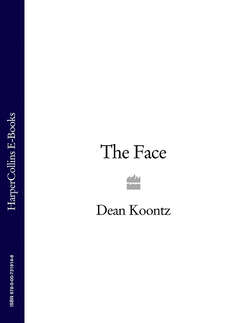Читать книгу The Face - Dean Koontz - Страница 23
ОглавлениеCHAPTER 19
UNDER A BLACK UMBRELLA, ETHAN Truman walked the grassy avenue of graves, his shoes squishing in the saturated turf.
Giant drooping cedars mourned with the weeping day, and birds, like spirits risen, stirred in the cloistered branches when he passed near enough to worry them.
As far as he could see, he alone walked in these mortal fields. Respect for the loved and lost was usually paid on sunny days, with remembrances as bright as the weather. No one would choose to visit a cemetery in a storm.
No one but a cop whose mainspring of curiosity had been wound tight, who had been born with a compulsive need to know the truth. A clockwork mechanism in his heart and soul, designed by fate and granted as a birthright, compelled him to follow wherever suspicion and logic might lead.
In this case, suspicion, logic, and dread.
Intuition wove in him the strange conviction that he would prove to be not the first visitor of the day and that in this bastion of the dead, he would discover something disturbing, though he had no idea what it might be.
Headstones of time-eaten granite, mausoleums crusted with lichen and stained by settled smog, memorial columns and obelisks tilted by ground subsidence: None of that traditional architecture identified this as a cemetery. The marker at each of these graves—a bronze plaque on a pale granite plinth—had been set flush with the grass. From a distance the burial ground appeared to be an ordinary park.
Radiant and unique in life, Hannah was here remembered with the same drab bronze that memorialized the thousands of others who slept eternal in these fields.
Ethan visited her grave six or seven times a year, including once at Christmas. And always on their anniversary.
He didn’t know why he came that often. Hannah didn’t lie here, only her bones. She lived in his heart, always with him.
Sometimes he thought he traveled to this place less to remember her—for she was not in the least forgotten—than to gaze at the empty plot beside her, at the blank granite tablet on which a cast-bronze plaque with his name would one day be fixed.
At thirty-seven, he was too young a man to welcome death, and life continued to hold the greater promise for him. Nevertheless, five years after losing Hannah, Ethan still felt that something of himself had died, as well.
Through twelve years of marriage, they delayed having children. They had been so young. No need to hurry.
No one expected a vibrant, beautiful, thirty-two-year-old woman to be diagnosed with a virulent cancer, to be dead four months later. When it took her, the malignancy also claimed the children they might have brought into the world, and the grandchildren thereafter.
In a sense, Ethan had died with her: the Ethan who would have been a loving father to the children blessed with her grace, the Ethan who would have known the joy of her company for decades yet to come, who would have known the peace and the purpose of growing old at her side.
Perhaps he would have been surprised to find her grave torn open, empty.
What he found instead of grave robbery, though unexpected, did not surprise him.
At the base of her bronze plaque lay two dozen fresh long-stemmed roses. The florist had wrapped them in a cone of stiff cellophane that partly protected the blooms from the pelting rain.
These were hybrid tea roses, a golden-red variety named Broadway. Of all the roses that Hannah loved and grew, Broadway had been her favorite.
Ethan turned slowly in a full circle, studying the cemetery. No figure moved anywhere on those gently sloped green acres.
He peered with special suspicion at every cedar, every oak. As best he could tell, those trunks didn’t shelter a lurking observer.
No traffic moved on the narrow winding road that served the cemetery. Ethan’s Expedition—white as winter, glimmering like ice—was the only vehicle parked along the lane.
Beyond the boundaries of the cemetery, urban vistas loomed in veils of rain and fog, less like a real city than like a metropolis in a dream. No rumble of traffic, no bleat of horn penetrated from its maze of streets, as though all its citizens had long ago gone horizontal in these silent grassy acres surrounding Ethan.
He looked down at the bouquet once more. In addition to bright color, the Broadway rose offers a fine fragrance. It flourishes in any sun-drenched garden and is more resistant to mildew than are many other varieties.
Two dozen roses found on a grave would not be admitted as evidence in a court of law. Yet Ethan regarded these colorful blooms as proof enough of a strange courtship of the dead, by the dead.
